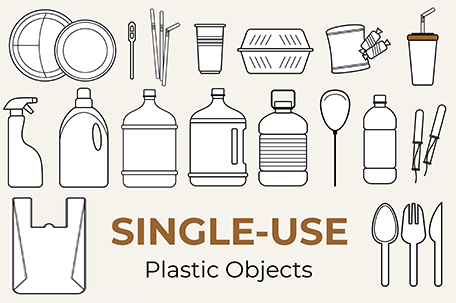
HARRISBURG– House lawmakers joined PennEnvironment recently to announce a package of bills aimed at addressing single-use plastics, pervasive issues of litter and the various environmental harms caused by a “throwaway” society.
Legislation in the “Zero Waste PA” package works to address issues created by a disposable society including single-use plastics such as straws, plastic bags and Styrofoam takeout food containers, electronic waste, funding Pennsylvania’s recycling programs and more.
“We can no longer ignore the growing waste problem that is threatening our environment. My colleagues and I have introduced a package of bills that, together, address this problem from a number of angles,” said Rep. Tim Briggs, D-Montgomery. “By encouraging the use of more naturally biodegradable materials, addressing issues with the way we recycle, and finding ways to support environmentally friendly practices, we can help preserve our planet for future generations.”
“Every day, unwitting Pennsylvanians are barraged with products that we’re expected to purchase and use, and then throw away. Only, there is no ‘away,’” said PennEnvironment Executive Director David Masur. “Instead, it ends up in landfills where it can cause water pollution, in incinerators that cause air pollution, or blowing around in our neighborhoods in the form of litter. Nothing we use for a few minutes should pollute our environment, neighborhoods, rivers and oceans for centuries to come.”
The measures that would be addressed in the package include:
• Prohibiting food establishments from using polystyrene containers to distribute prepared foods. (Rep. Tim Briggs)
• Dissuading litterers and illegal dumpers by increasing the fines and penalties for those caught illegally throwing away their garbage. (Rep. Donna Bullock)
• Prohibiting establishments from offering plastic straws except upon the customer’s request. (Rep. Mary Jo Daley)
• Increasing the disposal fee for municipal waste landfills from $4 per ton to $8 per ton to help support important conservation and environmental protection programs. (Rep. Elizabeth Fiedler)
• Increasing the recycling fee that landfill operators pay from $2 per ton to $5 per ton on waste received at their landfills, the first increase in 30 years. (Rep. Mary Isaacson)
• Authorizing counties that have recycling programs to collect a recycling and waste management fee of up to $4 per ton, to be used to create and maintain new or existing recycling programs, programs to clean up illegal dumping sites or litter, and/or programs for alternative energy. (Rep. Patty Kim)
• Significantly diverting organic waste from our landfills and incinerators and spurring a market for organic waste composting (Rep. Danielle Friel Otten)
• Establishing a statewide cigarette filter upcycling initiative, where a 20-cent, partially reimbursed deposit on each pack of cigarettes sold in Pennsylvania would be used for collection centers and safe reuse. (Rep. Chris Rabb)
• Ensuring that producers of plastic packaging take responsibility for the decisions they make by requiring that they cannot sell or distribute plastic packaging in Pennsylvania unless they are part of a recycling program to take it back. (Rep. Melissa Shusterman)
• Providing for a fee of two cents on each non-reusable plastic bag used by purchasers of consumer goods at retail establishments grossing over $1 million annually to support recycling. (Rep. Brian Sims and Rep. Jared Solomon)
• Creating a 5-cent beverage bottle and can deposit program in Pennsylvania. (Rep. Wendy Ullman)
• Encouraging the use of reusable water bottles by requiring that newly constructed state buildings, as well as existing state buildings undergoing renovations to water and pipe infrastructure, install water bottle filling stations. (Rep. Perry Warren)
• Addressing Pennsylvania’s failing electronic waste recycling law by taking from best practices implemented in other states to make Pennsylvania’s law effective. (Rep. Mike Zabel)
In the coming months, the lawmakers will be building co-sponsorship support for these measures and holding local events in their districts related to the package.
















Leave a Comment